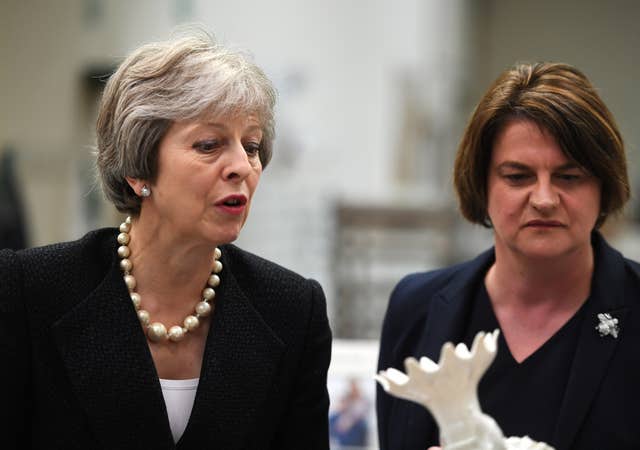What is the backstop in Brexit? Ireland’s Google questions answered
Here’s what people in Northern and the Republic of Ireland have been searching for as Theresa May pushes her Brexit deal.

As Brexit chaos reigns supreme in Westminster, here are answers to the top questions on Brexit that people in Northern and the Republic of Ireland have asked Google in the last four hours.
– What is Brexit?
Brexit is a slang term for Britain’s exit from the European Union. After a referendum on Thursday 23 June, 2016, the vote by the UK to leave the EU won by 51.9% to 48.1%.
The referendum turnout was 71.8%, with more than 30 million people voting.
Under Article 50 of the Lisbon Agreement, the UK has two years to agree with the EU on how to leave.
– What percentage of the population in Northern Ireland voted in Brexit referendum?
The majority of Northern Ireland voted to remain in the EU. The results saw the remain side gain 56% of the votes.
Constituencies which voted to remain included Foyle, West Tyrone, West Belfast, South Belfast, North Belfast, North Down, East Derry, South Down, Mid Ulster, Fermanagh and South Tyrone, Newry and Armagh.
Leave voters polled strongly in East Belfast, Lagan Valley, North Antrim, Strangford, East Belfast, East Antrim, South Antrim and Upper Bann.
– When does the Brexit transition period end?
Theresa May triggered this Article 50 on March 29, 2017, meaning the UK is scheduled to leave at 11pm UK time on Friday March 29, 2019.

The backstop is an assurance that Ireland will be able maintain an open border if the UK leaves the EU without securing a deal.
The backstop solution is an arrangement between the UK and Ireland that will apply to the Irish border in order to keep it open and trading goods and services between the two jurisdictions with few restrictions.
– How will Brexit affect Northern Ireland and the Republic of Ireland?
The International Monetary Fund (IMF) has said Ireland is one of the countries that would be hit by the economic effects of Brexit the hardest.
According to them, the loss in economic output for Ireland could be as much as for Britain itself.
The Oireachtas Finance Committee report also said lower exports would lead to lower spending by companies would hit employment and government revenues.
The analysis suggests employment levels could be 40,000 lower after 10 years and the unemployment rate could be close to two percentage points higher.
In Northern Ireland, some report Brexit is expected to have a disproportionate impact on the economy which is reliant on exports to the EU.
Some economists have also warned of a drop-off in foreign direct investment.
Brexit will also end the 3.5 billion euro in farm subsidies and structural grants received by Northern Ireland in the 2014-2020 period.
– What are the benefits for Ireland if Britain leaves the EU?
Some commentators argue post-Brexit Ireland will take on a more significant role in Europe as companies looking to expand are unlikely to consider the UK for European headquarters.
As the sole remaining larger English-speaking member with a similar legal system and cultural outlook as the UK, Ireland could arguably benefit from an absent UK in negotiations concerning trade and business.
For Northern Ireland, some argue their special geographic position could prove beneficial if the border remains open.
Should the border remain how it is currently, Northern Ireland would be the only part of the UK with no physical border to the EU.
Combined with a highly educated population, lower average wages than Britain and plans to reduce corporation tax from the UK rate of 19% to 12.5% – this could significantly enhance Northern Ireland’s appeal for businesses planning to relocate.
– What is the Brexit deal?
British and European Union negotiators agreed on a draft Brexit deal on Tuesday.
The agreement includes commitments over citizens’ rights, a proposed 21-month transition period after the UK’s departure and UK-wide.
This will legally obligate the UK to pay a divorce settlement of at least £39 billion to cover payments to the current EU budget and other outstanding financial commitments.
If there is no trade deal in place by the end of the transition period, the backstop will mean Northern Ireland would stay aligned to some EU rules on things such as food products and goods standards.
It would also involve a temporary single customs territory, effectively keeping the whole of the UK in the EU customs union.
– What will UK farmers do without CAP?
The Common Agricultural Policy (CAP) runs for a seven-year period in line with EU budget cycle. The current CAP agreement and funding runs until 2020. The UK Government has pledged to maintain the same cash funds as currently for CAP until the end of the Parliament, under the expectation that this will be 2022.
– What will happen to interest rates if there is a no deal Brexit?
The Bank of England has previously warned that there is no guarantee it will slash interest rates in the wake of a no-deal Brexit. It is hoped that it would repeat its decision to reduce borrowing costs after the Brexit referendum in June 2016, but it has argued that a no-deal Brexit would affect the economy’s supply which may lead to disruption at borders and companies moving overseas. Its governor, Mark Carney has previously suggested that interest rates may rise if there is a no-deal Brexit.





